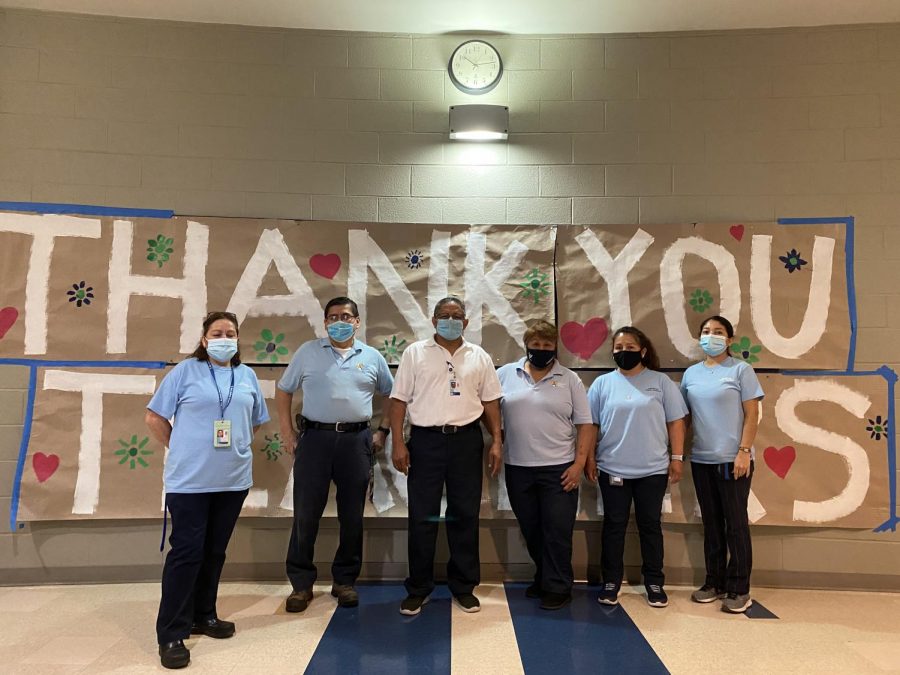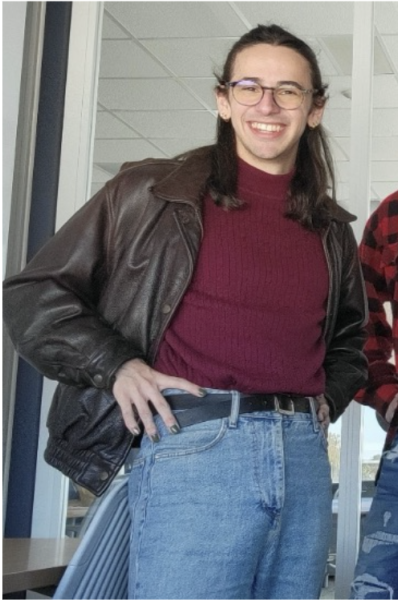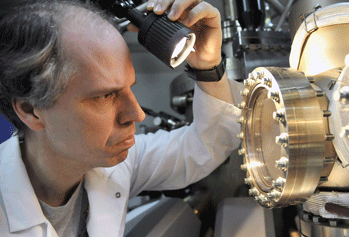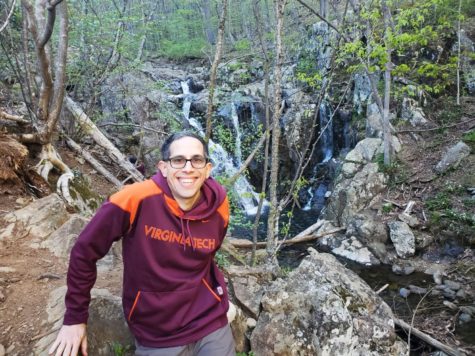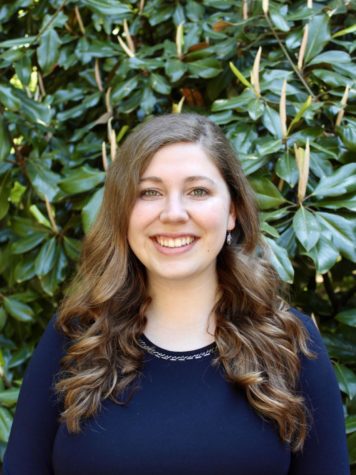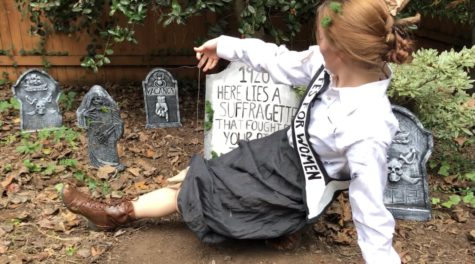Custodial staff vs. the pandemic
The custodial staff stands for a photo. They have been extremely helpful and necessary during this difficult time.
Nowadays, custodians are often surrounded by sanitizers and chemical cleaners daily. One of these chemicals is “KBQ,” also called “Virus”, and is the most commonly used chemical for cleaning hard surfaces. It’s manufactured by a company called Daycon, the same company who makes Windex, and is known for its green color. Although previously used to clean bathrooms and gym floors, now it’s being used virtually everywhere, creating more risk for custodians who need to prepare large amounts of it.
All of the chemicals delivered to schools come in highly concentrated doses to minimize shipping costs. When being used, all of the chemical cleaners need to be diluted with water, often by hand.
“We have to make sure we have the proper mixing with the sanitized and liquids, because we don’t get it already mixed, we get concentrate,” Mr. Jose Moreno, Maintenance Supervisor and Facilities Staff Member at Washington Liberty High School, said. “So I have to mix it for every single classroom to make sure no one burns their skin by using the chemical concentrate. So I have to dilute [it] myself before it goes on their hands.”
Because all of the chemicals are mixed by hand, and the amount of chemicals that need to be prepared daily is high, the risk for getting burned from splashes or spills is much higher compared to years prior. Furthermore, when the chemicals are not mixed properly, the students and staff are put at risk as well.
“If you happen to go to some schools, you will smell the chemicals — especially the disinfectant, you will smell it,” Mr. Ebenezer Oware, Maintenance Supervisor and Facilities staff member at Yorktown High School, said. “And it’s not good when it’s mixed wrong and you smell and inhale it. Because you are engaging and trying to mix it yourself, you will not get the right dosage or the right measure.”
Smelling a little bit of the chemical while using it is normal, but the smell should go away within ten to 20 minutes after using it. Thankfully, most of the deep cleaning is done at night and on Mondays, limiting student and staff exposure as much as possible, but creating an unhealthy environment for the custodial staff.
“So, if you don’t measure it very well, it has its own effect on people, especially people who are using it,” Mr. Oware said. “Because you mix it, you are using it, and you even breathe in it for a while. And that is not good for your health.”
However, there is a solution to this problem. In 2017, Yorktown High School volunteered to be a Pilot School, a school that tests new methods of learning and organization. This included testing out a chemical dispenser that would dilute the chemicals automatically, making the chemicals safe to use and prevent custodian contact.
“It dilutes the water and the chemical together so you don’t have to take a measuring cup and measure anything,” Mr. Arthur Bell, Director of Arlington Public Schools (APS) Plant Operations, said.
It was a success. The district saved money by using the chemicals more efficiently, and the custodians were happier with the new management of the cleaning supplies. But APS is still cautious; the chemicals are more than $500 each, and there still isn’t a guarantee they will work properly. Eventually, APS plans on adding chemical dispensers to all the school buildings, but first there needs to be more tests with other schools.
“We’re bringing on six more schools this summer,” Bell said. “And if those six schools like it, and we get the same results again, we’re going to either bring on an additional 12 or 13 schools, or we may bring on all of the schools, and give them this dispensing system.”
The Arlington public school buildings receiving a chemical dispenser this summer are: Discovery Elementary School, Alice West Fleet Elementary School, Hoffman-Boston Elementary School, Dorothy Hamm Middle School, The Heights, and Wakefield High School.
On top of the need to clean all surfaces, many custodians are under strict time limits to get the added work done.
“We have so much stuff to do and it’s not the same,” Mr. Moreno said. “It seems like we’re working overtime to clean and sanitize and take care of classrooms, cleaning all the doors and wiping off teachers’ desks.”
There is more to do around the school in between classes and less time to do it. Between the two lunches, the custodians need to wipe off everything that was used during that lunch. That includes tables, chairs, desks, bathrooms, door knobs, door handles, lunch lines and any trash that was left behind. But when it comes to classrooms, the work has actually decreased.
“The more students you have in a classroom, the more mess they make,” Mr. Oware said. “So if you have fewer, you don’t mess up the floor that much. When you come to my school right now, the floors look good because we have fewer students in the building. So the night workload has come down a little bit, but for [the] day, there’s more responsibility.”
There are two custodial groups that clean the buildings. The day group comes from 6:00 a.m. to 2:30 p.m.; their job is to disinfect after students, take care of the after lunch cleaning, make deliveries to classrooms and perform any maintenance that’s needed around the school building. The night time staff arrives at 2:30 p.m. and stays until 11:00 p.m.. That’s when most of the classroom and deep cleaning takes place.
In addition to all of this happening, the APS elementary schools were still in the process of hiring custodial staff when they reopened, and asked the high schools for support. Although many of the high schools were understaffed as well, a few stepped in to help. Once a week, a custodian would be sent over for Tuesday through Friday throughout a period of five months to help out.
“A month ago we were helping other elementary schools because they didn’t have enough support,” Mr. Moreno said. “So we, the high school, were giving them custodial staff to support them.”
The custodial staff is around germs and people all day, so many of them bring an extra pair of work clothes with them so they can change before going home.
“We also want to make sure that we don’t take a virus home with us,” Mr. Moreno said. “I’ve been telling most of my staff that they have to have extra clothes. Change your clothes just in case there’s any bacteria or anything so you don’t go and infect your family at home.”
Several APS schools are now equipped with washing machines for not only the custodial staff to be able to wash their clothes, but so reusable washcloths can be cleaned and used over and over again, cutting back on waste.
Moreno explained the connection between the staff isn’t like what it used to be. Before, meetings were held everyday, but not at most twice a week. COVID-19 has only allowed the staff to meet a few times in the halls, unlike before. But even with all of this going on, there is still tremendous support from teachers, staff, and students.
“There are some students who will tell me they appreciate my job,” Mr. Oware said. “If you come to my office right now, there’s about 20 or so notes from them on the wall. I love them so much I put them on my wall.”
Mr. Moreno explained he does this because he loves his job and his staff, but also for the students.
“I believe very strongly that you guys are the future and you guys will do something for us in the future,” Mr. Moreno said.


